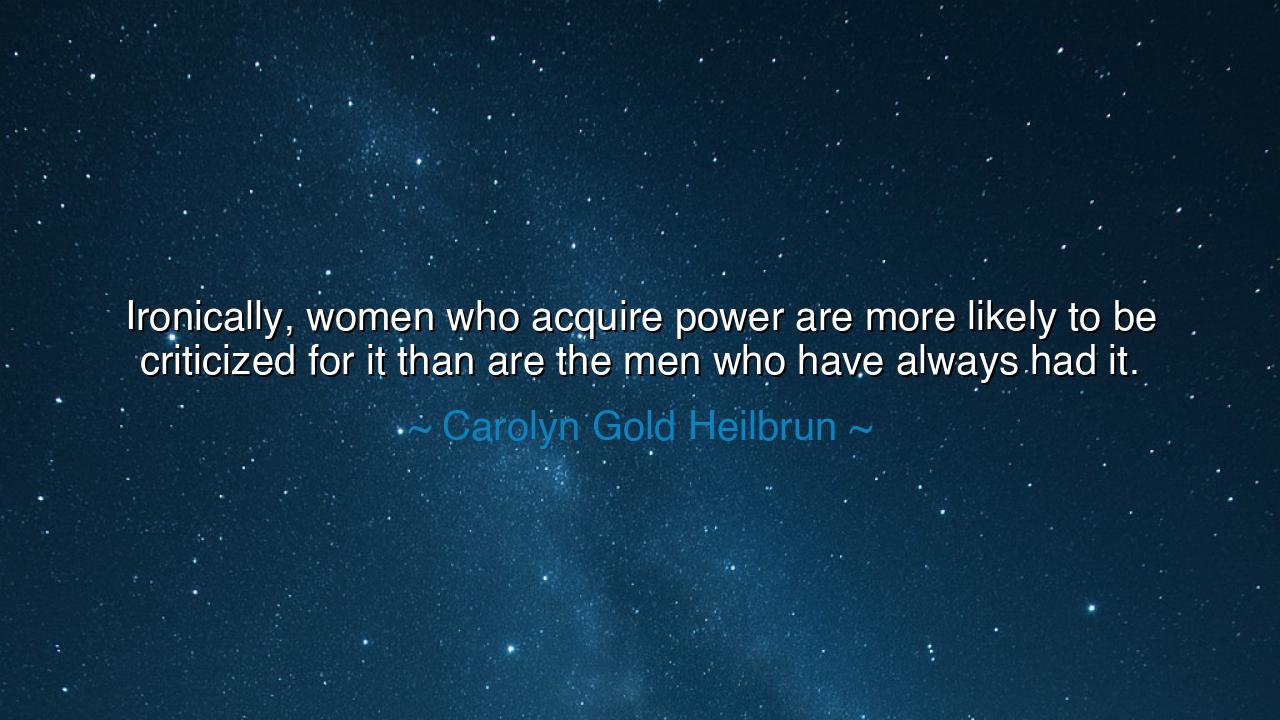
Ironically, women who acquire power are more likely to be
Ironically, women who acquire power are more likely to be criticized for it than are the men who have always had it.






Carolyn Gold Heilbrun, scholar and voice for women long silenced, declared with piercing honesty: “Ironically, women who acquire power are more likely to be criticized for it than are the men who have always had it.” In this statement she unveils a deep injustice: that when women step into the realm of power, they are judged not for how they rule, but for daring to rule at all. For men, authority is assumed; for women, it is treated as transgression. Thus the very act of claiming strength becomes the cause of scorn.
This irony lies at the heart of history. Men have wielded power for centuries, often with cruelty, yet their right to do so was rarely questioned. But when a woman grasps the scepter, critics arise to call her too bold, too proud, too unfeminine. Her power, no matter how justly used, becomes a scandal. Heilbrun names this truth, revealing that the criticism of women in authority springs not from their deeds, but from the prejudice of a world unaccustomed to their presence.
Consider the fate of Cleopatra, queen of Egypt. Brilliant, strategic, and wise, she held her kingdom against Rome’s might through skill and courage. Yet history painted her not as a ruler but as a temptress, reducing her power to seduction rather than acknowledging her intellect. So too with Elizabeth I of England, who forged an empire of stability and culture. She was praised, yet always with suspicion, as if her greatness needed excuse. In both we see Heilbrun’s truth: women in power are more often attacked for daring to lead than men are for failing in leadership.
In more recent times, the same pattern endures. When Margaret Thatcher rose to the highest office in Britain, her firmness was called cruelty, her resolve arrogance—qualities celebrated as strength in male leaders. Even today, women who ascend to positions of influence face scrutiny of their tone, their clothing, their very demeanor, criticisms rarely leveled at men. Their victories are diminished, their failures magnified, because their power itself is seen as unnatural.
O children of tomorrow, let this teaching guide you: judge not leaders by the accident of their gender, but by the justice of their rule. For power is not made greater or lesser by the hand that holds it. If the world is to grow wise, it must cast off the ancient prejudice that makes women’s strength a scandal. Remember Heilbrun’s words: the irony of this age must not endure into the next. Let power be honored wherever it is used for good, whether by man or woman, lest we remain blind to half the greatness humanity has to offer.






AAdministratorAdministrator
Welcome, honored guests. Please leave a comment, we will respond soon